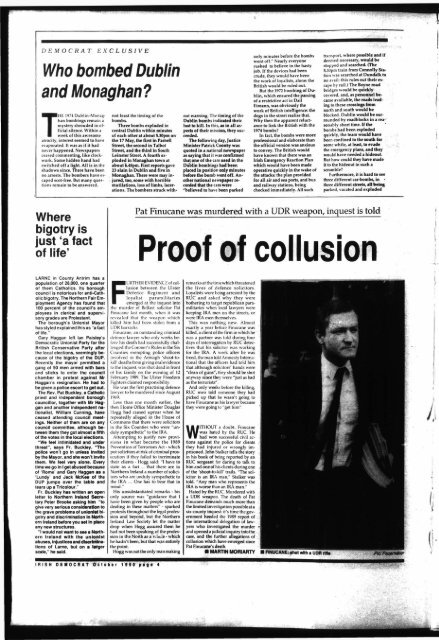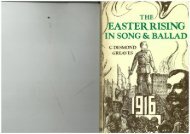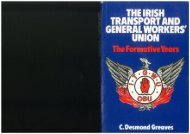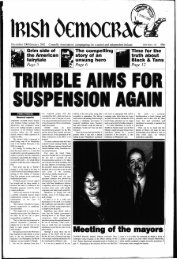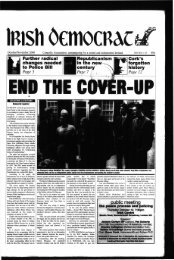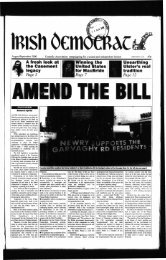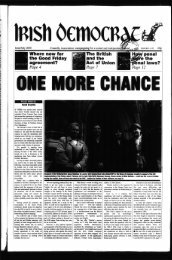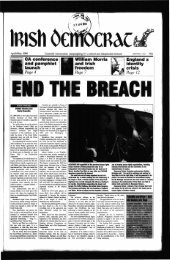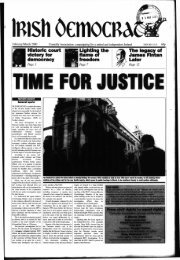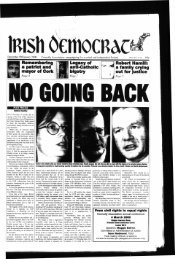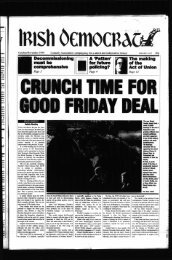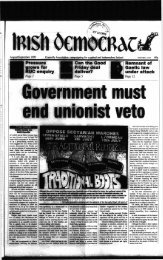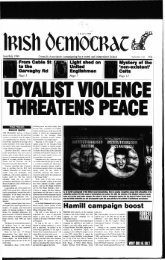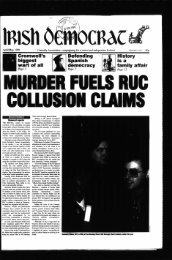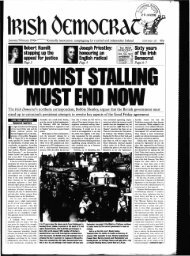Irish Democrat October 1990
You also want an ePaper? Increase the reach of your titles
YUMPU automatically turns print PDFs into web optimized ePapers that Google loves.
a<br />
D E M O C R A T<br />
E X C L U S I V E<br />
Who bombed Dublin<br />
andMonaghan?<br />
THE 1974 Dublin-Monaghan<br />
bombings remain a<br />
mystery shrouded in official<br />
silence. Within a<br />
week of this awesome<br />
atrocity, interest seemed to have<br />
evaporated. It was as if it had<br />
never happened. Newspapers<br />
ceased commenting, like clockwork.<br />
Some hidden hand had<br />
switched off a light. All is in the<br />
shadows since. There have been<br />
no arrests. The bombers have escaped<br />
scot-free. But many questions<br />
remain to be answered,<br />
Where<br />
bigotry is<br />
just 'a fact<br />
of life'<br />
LARNE in County Antrim has a<br />
population of 28,000, one quarter<br />
of them Catholics. Its borough<br />
council is notorious for anti-Catholic<br />
bigotry. The Northern Fair Employment<br />
Agency has found that<br />
100 percent of the council's employees<br />
in clerical and supervisory<br />
grades are Protestant.<br />
The borough's Unionist Mayor<br />
has styled explained this as "a fact<br />
of life.'<br />
Gary Haggan left Ian Paisley's<br />
<strong>Democrat</strong>ic Unionist Party for the<br />
British Conservative Party after<br />
the local elections, seemingly because<br />
of the bigotry of the DUP.<br />
Recently the mayor permitted a<br />
gang of 50 men armed with bars<br />
and sticks to enter the council<br />
chamber in protest against Mr<br />
Haggan's resignation. He had to<br />
be given a police escort to get out.<br />
The Rev. Pat Buckley, a Catholic<br />
priest and independent borough<br />
councillor, together with Mr Haggan<br />
and another independent nationalist,<br />
William Cunning, have<br />
ceased attending council meetings.<br />
Neither of them are on any<br />
council committee, although between<br />
them they got almost a fifth<br />
of the votes in the local elections.<br />
"We feel intimidated and under<br />
threat", says Fr. Buckley. "The<br />
police won't go in unless invited<br />
by the Mayor, and she won't invite<br />
them. We feel very alone. Every<br />
time we go in I get abused because<br />
of Rome' and Gary Haggan as a<br />
'Lundy' and Jack McKee of the<br />
DUP jumps over the table and<br />
tears up a Tricolour."<br />
Fr. Buckley has written an open<br />
letter to Northern Ireland Secretary<br />
Peter Brooke asking him "to<br />
give very serious consideration to<br />
the grave problems of unionist bigotry<br />
and discrimination in Northern<br />
Ireland before you set in place<br />
any new structures.<br />
"I would not want to see a Northern<br />
Ireland with the unionist<br />
abuses, injustices and discriminations<br />
of Larne, but on a larger<br />
scale," he said.<br />
not least the timing of the<br />
bombs.<br />
Three bombs exploded in<br />
central Dublin within minutes<br />
of each other at about 5.30pm on<br />
the 17 May, the first in Parnell<br />
Street, the second in Talbot<br />
Street, and the third in South<br />
Leinster Street. A fourth exploded<br />
in Monaghan town at<br />
about '6.48pm. First reports gave<br />
23 slain in Dublin and five in<br />
Monaghan. There were may injured,<br />
too, some with horrible<br />
mutilations, loss of limbs, lacerations.<br />
The bombers struck without<br />
warning. The timing of the<br />
Dublin bombs indicated their<br />
lust to kill. In this, as in all aspects<br />
of their mission, they succeeded.<br />
The following day, Justice<br />
Minister Patrick Coonfey was<br />
quoted in a national newspaper<br />
as saying that it was confirmed<br />
that one of the cars used in the<br />
Dublin bombings had been<br />
placed in position only minutes<br />
before the bomb went off. Another<br />
national newspaper recorded<br />
that the cars were<br />
"believed to have been parked<br />
only minutes before the bombs<br />
went off." Nearly everyone<br />
rushed to believe in the hasty<br />
job. If the devices had been<br />
crude, they would have been<br />
the work of loyalists, alone: the<br />
British would be ruled out.<br />
But the 1972 bombing of Dublin,<br />
which ensured the passing<br />
of a restrictive act in Dail<br />
Eireann, was obviously the<br />
work of British intelligence: the<br />
dogs in the street realise that.<br />
Why then the apparent reluctance<br />
to link the British with the<br />
1974 bombs?<br />
In fact, the bombs were more<br />
professional and elaborate than<br />
the official version was anxious<br />
to convey. The British would<br />
have known that there was an<br />
<strong>Irish</strong> Emergency Reaction Plan<br />
which would have been made<br />
operative quickly in the wake of<br />
the attacks: the plan provided<br />
for all air and sea ports, and bus<br />
and railway stations, being<br />
checked immediately. All such<br />
transport, where possible and if<br />
deemed necessary, would be<br />
stopped and searched. (The<br />
5.30pm train from Connolly Station<br />
was searched at Dundalk to<br />
no avail: this rules out their escape<br />
by rail.) The Boyne road<br />
bridges would be quickly<br />
cov ered, and, as personnel became<br />
available, the roads leading<br />
to these crossings from<br />
north and south would be<br />
blocked. Dublin would be surrounded<br />
by roadblocks in a reasonably<br />
short time. If the<br />
bombs had been exploded<br />
quickly, the team would have<br />
been confined to the south for<br />
some while, at least, to evade<br />
the emergency plans, and they<br />
would have needed a hideout.<br />
But how could they have made<br />
it to the hideout in such a<br />
scramble?<br />
Furthermore, it is hard to see<br />
three different car-bombs, in •<br />
three different streets, all being<br />
parked, vacated and exploded<br />
Pat Finucane was murdered with a UDR weapon, inquest is told<br />
FURTHER EVIDENCE of collusion<br />
between the Ulster<br />
Deferrce Regiment and<br />
loyalist paramilitaries<br />
emerged at the inquest into<br />
the murder of Belfast solicitor Pat<br />
Finucane last month, when it was<br />
revealed that the weapon which<br />
killed him had been stolen from a<br />
UDR barracks.<br />
Finucane, an outstanding criminal<br />
defence lawyer who only weeks before<br />
his death had successfully challenged<br />
the Coroner's Rules in the Six<br />
Counties exempting police officers<br />
involved in the Armagh 'shoot-tokill'<br />
deaths from giving oral evidence<br />
to the inquest, was shot dead in front<br />
of his family on the evening of 12<br />
February 1989. The Ulster Freedom<br />
Fighters claimed responsibility.<br />
He was the first practising defence<br />
lawyer to be murdered since August<br />
1969.<br />
Less than one month earlier, the<br />
then Home Office Minister Douglas<br />
Hogg had caused uproar when he<br />
repeatedly alleged in the House of<br />
Commons that there were solicitors<br />
in the Six Counties who were "unduly<br />
sympathetic" to the IRA.<br />
Attempting to justify new provisions<br />
in what became the 1989<br />
Prevention of Terrorism Act - which<br />
put solicitors at risk of criminal prosecution<br />
if they failed to incriminate<br />
their clients - Hogg said: "I have to<br />
state as a fact ... that there are in<br />
Northern Ireland a number of solicitors<br />
who are unduly sympathetic to<br />
the IRA .... One has to bear that in<br />
mind."<br />
His unsubstantiated remarks - his<br />
only source was "guidance that I<br />
have been given by people who are<br />
dealing in these matters" - sparked<br />
protests throughout the legal profession<br />
and beyond, but the Northern<br />
Ireland Law Society let the matter<br />
drop when Hogg assured them he<br />
had not been speaking of the profession<br />
in the North as a whole - which<br />
he hadn't been, but that was entirely<br />
the point.<br />
Hogg was not the only man making<br />
remarks at the time which threatened<br />
the lives of defence solicitors.<br />
Loyalists were being arrested by the<br />
RUC and asked why they were<br />
bothering to target republican paramilitaries<br />
when local lawyers were<br />
keeping IRA men on the streets, or<br />
were IRA men themselves.<br />
This was nothing new. Almost<br />
exactly a year before Finucane was<br />
killed, a client of the firm in which he<br />
was a partner was told during four<br />
days of interrogation by RUC detectives<br />
that his solicitor was working<br />
for the IRA. A week after he was<br />
freed, the man told Amnesty International<br />
that the officers had told him<br />
that although solicitors' hands were<br />
"clean of guns", they should be shot<br />
anyway since they were "just as bad<br />
as the terrorists".<br />
And only weeks before the killing,<br />
RUC men told someone they had<br />
picked up that he wasn't going to<br />
have Finucane as his lawyer because<br />
they were going to "get him".<br />
WITHOUT a doubt, Finucane<br />
was hated by the RUC. He<br />
had won successful civil actions<br />
against the police for clients<br />
they had injured or wrongly imprisoned.<br />
John Stalker tells the story<br />
in his book of being reported by an<br />
RUC sergeant for daring to talk to<br />
him and one of his clients during one<br />
of the 'shoot-to-kill' trails. "The solicitor<br />
is an IRA man," Stalker was<br />
told. "Any man who represents the<br />
IRA is worse than an IRA man."<br />
Hated by the RUC. Murdered with<br />
a UDR weapon. The death of Pat<br />
Finucane demands much more than<br />
the limited investigation possible at a<br />
six-county inquest: it's time the government<br />
heeded the 1989 report of<br />
the international delegation of lawyers<br />
who investigated the murder<br />
and opened a judicial inquiry into the<br />
case, and the further allegations of<br />
collusion which have emerged since<br />
Pat Finucane's death.<br />
• MARTIN MORIARTY<br />
I FINUCANE: shot with a UOR rifle<br />
within minutes of each other,<br />
especially as one Of more of<br />
the streets could have been ><br />
crowded. One car might have<br />
succeeded while unavailability<br />
of parking space could<br />
have forced another to cruise<br />
around with its Northern Ire*<br />
land number plates looking<br />
for somewhere to park. Advance<br />
booking was not<br />
possible. If the bombs went<br />
off at different times, the bombers,<br />
in a strange city, would<br />
have been in jeopardy. The<br />
British would not tolerate such<br />
a plan. They would inste&d<br />
allow for parking at the selected<br />
points by manipulating<br />
the timing devices. They<br />
would buy time.<br />
A synchronised time-delay<br />
was required. Besides ensuring<br />
uniformity and good<br />
order, this permitted die bombers<br />
to get to their rendezvous<br />
on foot, without undue haste<br />
drawing attention, where it is<br />
PETER BROOKE, Northern<br />
Ireland Secretary, has<br />
withdrawn all government<br />
funding from one of the<br />
main organisations teaching<br />
<strong>Irish</strong> in the Six Counties.<br />
Brooke has decided not to<br />
renew the £80,000 grant to<br />
the West Belfast Committee<br />
of Glor na nGael which<br />
has kept going 20 full-time<br />
and part-time teachers at<br />
seven <strong>Irish</strong> language nursery<br />
schools. Three years<br />
ago the committed received<br />
an award for its<br />
work in promoting <strong>Irish</strong><br />
from President Patrick Hillery.<br />
The reason is that the<br />
grant would allegedly<br />
help further the aims of<br />
paramilitary organisations,<br />
whether directly or<br />
indirectly, for of course the<br />
Republican movement<br />
over<br />
cut<br />
also supports the <strong>Irish</strong> language.<br />
No evidence has been<br />
presented to substantiate<br />
this claim by the Northern<br />
Ireland Office. The Committee's<br />
chairwoman,<br />
Noirin Nli Chleirigh, said<br />
that the decision would hit<br />
at the root of <strong>Irish</strong> teaching<br />
in the North because<br />
classes could not be<br />
funded for the 140 children<br />
due to start nfarsery school<br />
in September.<br />
The Governm&nfthas<br />
given £50,000 to the Ultach<br />
Trust, Glor na nGael's<br />
main rival, and promised a<br />
further £250,000 to the<br />
trust's capital fund. Cultural<br />
policy in the North is<br />
ever more clearly becoming<br />
an arm of the British<br />
Government's attempts to<br />
strengthen its sovereignty<br />
throughout the area.<br />
THE new Sandoz plant brings to 18 the number of<br />
chemical factories in Cork harbour - and residents are<br />
none too happy with it. They say they are fundamentally<br />
opposed to the new plant because if What they<br />
have had to suffer from the noxious fumes pumped<br />
out by the other companies in the area. And they have<br />
no confidence In the government, the Industrial Development<br />
Authority or Cork County Council monitoring<br />
the manufacturing process.<br />
Sandoz comes to Cork with,a bad hlstoty. Four<br />
years ago, a century-long relationship between the<br />
land was shattered forever. In the early hours of<br />
Saturday 1 November, sirens wailed as fire engines<br />
raced through the darkened streets.<br />
The fire at Schwelzerhalle, a Sandoz agro-chemicals<br />
the ground rules between the people and the chemical<br />
industry. Today, four years on, the residents of<br />
basle have a highly sensitive, almost schizoid relationship<br />
with the giant industrial cauldrons boiling<br />
aroundthem.<br />
According to local people, the stench of the chemical<br />
can suddenly change the atmosphere In winter.<br />
The company hit the headlines when toxic pollution<br />
believed their getaway vehicles<br />
awaited. They had to<br />
allow travelling time to gain<br />
their hideout, hopefully before<br />
the bombs exploded, in a<br />
hamlet in the south of Dublin<br />
_ outside die area of expected intensive<br />
search. Allowing for<br />
all this there would have been<br />
a time-delay of 30 to 60<br />
minutes.<br />
Evidence confirming such a<br />
delay is provided by Robert<br />
Whelan, a young barman<br />
working in Ryan's pub in Parnell<br />
Street, who said he saw<br />
the car-bomb parked as he returned<br />
to work at approximately<br />
4.55pm: there was, he said,<br />
no-one hanging around it then.<br />
The Justice Minister was<br />
also reported as saying that<br />
the government had an open<br />
mind as to who was responsible<br />
the day after die attacks.<br />
He spoke of the cult of violence<br />
in irish life and the<br />
need to extirpate iL He mentioned<br />
nothing of the cult of violence<br />
in British life.<br />
Along witt this seemingly<br />
astounding ability to link<br />
these dastardly bombings to<br />
their correct origin, Cooney's<br />
statement also pointed attention<br />
in the wrong direction.<br />
Subsequently, officialdom has<br />
failed to reveal anything. Surely<br />
people deserve more? Relatives<br />
of the victims are very<br />
worried about this lack of information.<br />
A cynic would say:<br />
"If it had happened in Foxrock,<br />
they'd have got to the<br />
bottom of it in jigtime!" Perhaps<br />
all the children aren't<br />
cherished equally.<br />
Where is the <strong>Irish</strong> Chris<br />
Mullin?<br />
• This article is based on material<br />
which appeared in <strong>Irish</strong><br />
in Anois earlier this year. It is<br />
published in English for the<br />
first time here with permission.<br />
Threaten Castro,<br />
and walk free<br />
JOE DOHERTY is the 35-<br />
year-old Belfast man who<br />
has been in federal prison<br />
in New York for the past<br />
seven years, without once<br />
having been charged, tried<br />
or sentenced.<br />
He is fighting the attempt<br />
of the British Government<br />
and the US Justice Department<br />
to have him deported.<br />
Doherty was<br />
charged with killing a British<br />
SAS officer in a gun<br />
battle on the Antrim Road<br />
in 1980. He escaped with<br />
seven others while awaiting<br />
the verdict and was arrested<br />
in New York two<br />
years later as an illegal<br />
alien. He claims that his air<br />
leged offence is political<br />
and people are campaigning<br />
against his extradition<br />
all over the United<br />
States.<br />
New York Congressman<br />
Gary Ackerman contrasted<br />
Doherty's situation<br />
in his legal limbo with that<br />
of anti-Castro Cuban Orlando<br />
Bosch. Bosch, who is<br />
now free in Miami on parole,<br />
was convicted,<br />
among numerous other<br />
terrorist activities, of blowing<br />
up a plane and killing<br />
73 people aboard.<br />
Congressman Ackerman<br />
read into the congressional<br />
record a Wall Street Journal<br />
article contrasting the two<br />
men's fates by Alexander<br />
Cockburn which concluded:<br />
"Bosch is released and<br />
Doherty held in his cell.<br />
The <strong>Irish</strong>man should hispanicize<br />
his name, make<br />
more influential friends in<br />
Miami and start threatening<br />
Fidel Castro. This is the<br />
essential extrajudicial factor<br />
he has overlooked."<br />
from its Schweizerhalle plant caused an environmental<br />
disaster wiping out all life on the Rhine, when<br />
water carrying the lethal pollutant leaked into the<br />
river after a fire in a warehouse. People are naturally<br />
concerned about pollution in Cork harbour having<br />
learned that rotting and cancerous fish were taken<br />
from the Rhine after the accident.<br />
Things are bad enough already without a Sandoz<br />
accident waiting to happen: four out of every five fish<br />
taken from the harbour are diseased, and scientists .<br />
Investigating the problem at University College Cork<br />
are convinced that the incidence of diaease among<br />
shellfish and other fish in the harbour Is linked to<br />
environmental pollution.<br />
But Cork County Council argue there are no problems.<br />
They have ignored the warnings ot doctors<br />
abgut the dangers of human brain damage In the<br />
harbour area. Asthma arid tumours have Increased<br />
and doctors say only a detailed and rigorous public<br />
health study can resolve their anxieties.<br />
What led Sandoz to Ireland? . Switzerland is not a<br />
member of the EC, whose markets account for 43 per<br />
cent ofthe company's total sales, and Sandoz needs<br />
a base Inside the Community before 1992.<br />
• JIM SAVAGE<br />
WORLD<br />
B Y P O LI T I C U S<br />
COMMENT<br />
Capitalism in<br />
trouble?<br />
AS IT NOT some American professor who<br />
wrote a much-touted article last year referring to<br />
the end of the Cold War as the end of history?<br />
As we look round the world at the moment it is<br />
hard to see much sign of history ending! Would<br />
it not just be like the ironical spirit of history, which delights<br />
in playing tricks on the over-confident, that just when various<br />
countries of the socialist Second World stretch out their<br />
hands to grasp the goodies of the capitalist First World, the<br />
latter should topple into unprecedented economic crisis?<br />
There are many signs something like this could be about<br />
to happen. The 1980s have seen a fantastic speculative boom<br />
throughout the West Share values have soared, and with<br />
them the money value of the assets supposedly underlying<br />
them. Banks have financed takeover bids by lending against<br />
inflating assets. The money borrowed in turn has been used<br />
to bid-up share values more. This then has been used to justify<br />
more borrowing. And so the cycle went on.<br />
This credit balloon has expanded fastest in Japan, where<br />
the Banks have sanctioned vast credit expansion against the<br />
security of inflated share prices and land values. But these<br />
have now started to dive. Since last December share values<br />
on the Japanese stock market have fallen by one-third. This<br />
threatens the solvency of the Japanese Banks and security<br />
houses. To cover themselves they sell property, including<br />
their vast holdings in America. Banks strapped for cash call<br />
in their loans from all over the place in a frantic rush to<br />
liquidity. There is a credit crunch whose sign is soaring interest<br />
rates. In America there is a financial crisis already because<br />
their building societies ("thrifts" as they call them)<br />
have made trillions of bad loans, which the Government<br />
must pick up the tab for. In Germany stock-markets are sliding<br />
because of the rocketing cost of the West's destructive<br />
takeover of the East. The general prospect next year is of recession<br />
plus inflation.<br />
On top of all this financial and stock-market tinder the<br />
Gulf crisis promises war and rocketing oil prices. Capitalism<br />
is the history of wars, socialism the history of mistakes, as<br />
the man said. It is the capitalist countries' desire for cheap oil<br />
- not respect for United Nations resolutions - which has sent<br />
America to bolster up the sheikdoms of Arabia. In fact<br />
American is acting as a quasi-mercenary for Japan and West<br />
Germany in the Gulf region. Although the latter are really<br />
much more dependent than the US on oil imports from the<br />
area, they are not sending any armies or navies themselves.<br />
At most they promise to pick up some of America's bills, just<br />
as they used do with hired mercenaries in feudal days.<br />
In the Gulf crisis the policy of the British Government<br />
shows itself even more bankrupt than usual. At Suez in 1956<br />
it was the US which pulled the rug from under Britain when<br />
Anthony Eden tried to topple Nasser. Now Thatcher urges on<br />
Bush against Saddam Hussein, while the Germans and the<br />
Russians are laughing up their sleeves. Britain, an oil exporter,<br />
can gain nothing from the Gulf adventure. If it comes to<br />
war the British will find themselves hated in quite new ways<br />
all over the Arab world. And for no obvious advantage to<br />
themselves. The Russians, as the world's biggest oil producer,<br />
will be the principal beneficiaries of the oil price hike.<br />
While the East European countries, which used grumble at<br />
Russian tutelage, now find themselves having to pay in dollars<br />
instead of goods for Russian oil. -<br />
Thatcher hopes that if she is seen as Britain's Boadicea<br />
against Iraq, the electorate will award her the general election<br />
as they did in 1983 after the Falklands. It is Neil Kinnock's<br />
fear of this that makes him cling to her like a limpet,<br />
so that he will not appear any less warlike. For Thatcher a<br />
war now appears a better bet than a pre-election economic<br />
splurge. Looming economic crisis makes such opportunism<br />
harder to engineer. Yet she still seems intent on joining the<br />
Common Market's EMS, locking sterling into a fixed exchange<br />
rate with the deutschnurk and the franc. The idea is<br />
that this will make sterling a hard currency, so that people<br />
with capital will be anxious to buy it. Capital will flow into<br />
Britain, interest rates can come down, and the currently<br />
slumped housing market will take off again, to the delight of<br />
the owner-occupying middle classes.<br />
Yet a Britain in the EMS will bring ruin to British industry.<br />
It will make imports cheaper and exports more expensive,<br />
worsening the country's already terrible trade deficit.<br />
The City likes a strong pound. It makes their assets more<br />
valuable in terms of foreign currencies. But it means more<br />
lay-offs and ever longer dole queues for ordinary people.<br />
1 Yet again the ineffable Neil Kinnock says that Thatcher, to<br />
prove her "Europeanism", should join the EMSI When will<br />
ordinary Labour members pull the man back from his folly?<br />
• i<br />
..


